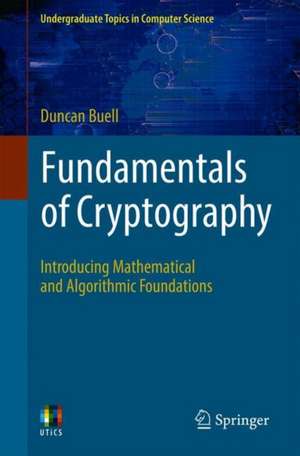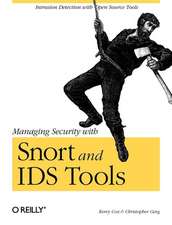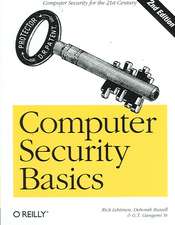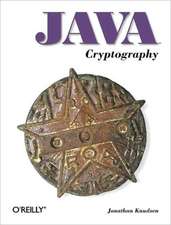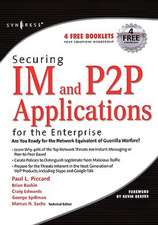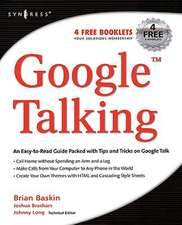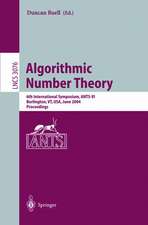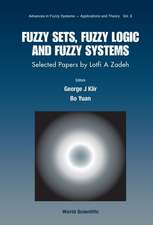Fundamentals of Cryptography: Introducing Mathematical and Algorithmic Foundations: Undergraduate Topics in Computer Science
Autor Duncan Buellen Limba Engleză Paperback – 16 iun 2021
This unique textbook text balances the theorems of mathematics against the feasibility of computation. Cryptography is something one actually “does”, not a mathematical game one proves theorems about. There is deep math; there are some theorems that must be proved; and there is a need to recognize the brilliant work done by those who focus on theory. But at the level of an undergraduate course, the emphasis should be first on knowing and understanding the algorithms and how to implement them, and also to be aware that the algorithms must be implemented carefully to avoid the “easy” ways to break the cryptography. This text covers the algorithmic foundations and is complemented by core mathematics and arithmetic.
Din seria Undergraduate Topics in Computer Science
- 20%
 Preț: 304.13 lei
Preț: 304.13 lei - 20%
 Preț: 233.75 lei
Preț: 233.75 lei - 20%
 Preț: 350.89 lei
Preț: 350.89 lei - 20%
 Preț: 306.58 lei
Preț: 306.58 lei - 20%
 Preț: 187.22 lei
Preț: 187.22 lei - 20%
 Preț: 272.43 lei
Preț: 272.43 lei - 20%
 Preț: 280.93 lei
Preț: 280.93 lei - 20%
 Preț: 245.43 lei
Preț: 245.43 lei - 20%
 Preț: 305.61 lei
Preț: 305.61 lei - 20%
 Preț: 376.76 lei
Preț: 376.76 lei - 20%
 Preț: 246.39 lei
Preț: 246.39 lei - 20%
 Preț: 336.99 lei
Preț: 336.99 lei - 20%
 Preț: 341.22 lei
Preț: 341.22 lei - 20%
 Preț: 192.73 lei
Preț: 192.73 lei - 20%
 Preț: 306.72 lei
Preț: 306.72 lei - 20%
 Preț: 384.11 lei
Preț: 384.11 lei - 20%
 Preț: 316.07 lei
Preț: 316.07 lei - 20%
 Preț: 374.37 lei
Preț: 374.37 lei - 20%
 Preț: 225.03 lei
Preț: 225.03 lei - 20%
 Preț: 226.65 lei
Preț: 226.65 lei - 20%
 Preț: 375.54 lei
Preț: 375.54 lei - 20%
 Preț: 395.05 lei
Preț: 395.05 lei - 20%
 Preț: 307.17 lei
Preț: 307.17 lei - 20%
 Preț: 254.37 lei
Preț: 254.37 lei -
 Preț: 334.89 lei
Preț: 334.89 lei - 20%
 Preț: 227.16 lei
Preț: 227.16 lei - 20%
 Preț: 304.37 lei
Preț: 304.37 lei - 20%
 Preț: 316.24 lei
Preț: 316.24 lei - 20%
 Preț: 287.03 lei
Preț: 287.03 lei - 20%
 Preț: 342.46 lei
Preț: 342.46 lei - 20%
 Preț: 276.82 lei
Preț: 276.82 lei - 20%
 Preț: 237.35 lei
Preț: 237.35 lei - 20%
 Preț: 374.20 lei
Preț: 374.20 lei - 20%
 Preț: 304.44 lei
Preț: 304.44 lei - 20%
 Preț: 297.28 lei
Preț: 297.28 lei - 20%
 Preț: 579.37 lei
Preț: 579.37 lei - 20%
 Preț: 298.18 lei
Preț: 298.18 lei - 20%
 Preț: 243.35 lei
Preț: 243.35 lei - 20%
 Preț: 302.80 lei
Preț: 302.80 lei - 20%
 Preț: 297.66 lei
Preț: 297.66 lei - 20%
 Preț: 300.89 lei
Preț: 300.89 lei - 20%
 Preț: 191.36 lei
Preț: 191.36 lei - 20%
 Preț: 278.11 lei
Preț: 278.11 lei - 20%
 Preț: 304.21 lei
Preț: 304.21 lei - 20%
 Preț: 389.96 lei
Preț: 389.96 lei
Preț: 258.79 lei
Preț vechi: 323.49 lei
-20% Nou
Puncte Express: 388
Preț estimativ în valută:
49.54€ • 53.82$ • 41.64£
49.54€ • 53.82$ • 41.64£
Carte disponibilă
Livrare economică 31 martie-14 aprilie
Livrare express 14-20 martie pentru 29.78 lei
Preluare comenzi: 021 569.72.76
Specificații
ISBN-13: 9783030734916
ISBN-10: 3030734919
Pagini: 279
Ilustrații: XV, 279 p. 50 illus., 1 illus. in color.
Dimensiuni: 155 x 235 x 23 mm
Greutate: 0.42 kg
Ediția:1st ed. 2021
Editura: Springer International Publishing
Colecția Springer
Seria Undergraduate Topics in Computer Science
Locul publicării:Cham, Switzerland
ISBN-10: 3030734919
Pagini: 279
Ilustrații: XV, 279 p. 50 illus., 1 illus. in color.
Dimensiuni: 155 x 235 x 23 mm
Greutate: 0.42 kg
Ediția:1st ed. 2021
Editura: Springer International Publishing
Colecția Springer
Seria Undergraduate Topics in Computer Science
Locul publicării:Cham, Switzerland
Cuprins
1. Introduction.- 2. Simple Ciphers.- 3. Divisibility, Congruences, and Modular Arithmetic.- 4. Groups, Rings, Fields.- 5. Square Roots and Quadratic Symbols.- 6. Finite Fields of Characteristic 2.- 7. Elliptic Curves.- 8. Mathematics, Computing, and Arithmetic.- 9. Modern Symmetric Ciphers — DES and AES.- 10. Asymmetric Ciphers — RSA and Others.- 11. How to Factor a Number.- 12. How to Factor More Effectively.- 13. Cycles, Randomness, Discrete Logarithms, and Key
Exchange.- 14. Elliptic Curve Cryptography.- 15. Quantum Computing and Cryptography.- 16. Lattice-Based Cryptography.- 17. Homomorphic Encryption.- 18. Exercises.
Notă biografică
Duncan Buell, professor emeritus in the Dept. of Computer Science and Engineering at University of South Carolina, also has 15 years of experience at a research lab doing high-performance computing research in support of the US National Security Agency.
Textul de pe ultima copertă
Cryptography, as done in this century, is heavily mathematical. But it also has roots in what is computationally feasible.
This unique and accessible textbook balances the theorems of mathematics against the feasibility of computation. Cryptography is something one actually “does”, not a mathematical game about which one proves theorems. There is deep math; there are some theorems that must be proven; and there is a need to recognize the brilliant work done by those who focus on theory. But at the level of an undergraduate course, the emphasis should be first on knowing and understanding the algorithms and how to implement them, and also to be aware that the algorithms must be implemented carefully to avoid the “easy” ways to break the cryptography. Hence, this text covers the algorithmic foundations and is complemented by core mathematics and arithmetic.
Topics and features:
Duncan Buell, professor emeritus in the Dept. of Computer Science and Engineering at University of South Carolina, also has 15 years of experience at a research lab doing high-performance computing research in support of the U.S. National Security Agency.
This unique and accessible textbook balances the theorems of mathematics against the feasibility of computation. Cryptography is something one actually “does”, not a mathematical game about which one proves theorems. There is deep math; there are some theorems that must be proven; and there is a need to recognize the brilliant work done by those who focus on theory. But at the level of an undergraduate course, the emphasis should be first on knowing and understanding the algorithms and how to implement them, and also to be aware that the algorithms must be implemented carefully to avoid the “easy” ways to break the cryptography. Hence, this text covers the algorithmic foundations and is complemented by core mathematics and arithmetic.
Topics and features:
- Provides an exhaustive set of useful examples, to optimally convey thecryptographic computations
- Focuses on doing cryptography, rather than on proving theorems
- Includes detailed source code and a test suite
- Describes NTRU as a lattice-based cryptographic algorithm
- Addresses, among other topics, factoring attacks (including their history), elliptic curve cryptography, quantum cryptography, and homomorphic encryption
Duncan Buell, professor emeritus in the Dept. of Computer Science and Engineering at University of South Carolina, also has 15 years of experience at a research lab doing high-performance computing research in support of the U.S. National Security Agency.
Caracteristici
Balances the theorems of mathematics against the feasibility of computation Covers the algorithmic foundations as well core mathematics and arithmetic Demonstrates how cryptography is something one actually “does,” rather than theorizes about
